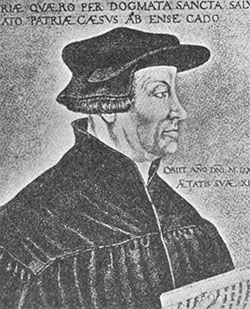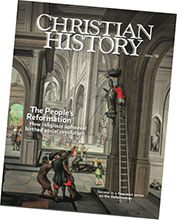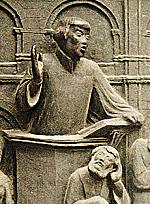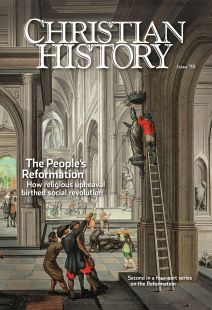People's Reformation, Did you know?

The Zwingli you never knew
As a youth Huldrych Zwingli (1484–1531), leader of the Swiss Reformation, learned violin, harp, flute, dulcimer, hunting horn, and lute. He amused children from his congregation by playing the lute for them, and enemies called him “that evangelical lute-player and fifer.” Yet he opposed instrumental music in worship (as well as choral music and chanting) and presided over breaking up the great organ in his church in Zurich. Open to congregational singing, he wrote at least three hymns.
As a chaplain with Swiss mercenary troops in Italy, Zwingli saw 6,000 Swiss youth die in the service of the pope. He worked hard to shift the Swiss economy from mercenary service to agriculture and trade, telling his people, “You are a tool in the hands of God. … How fortunate you are that he lets you take part in his work.”
In 1522 Zwingli married Anna Reinhard (c. 1487–1538), a young widow with three children. After two years of secret marriage, they married publicly three months before their first child was born. Concerned for her husband’s safety, Anna warned him not to go out alone at night and to watch his food carefully for fear of poison. In the end Zwingli died in a battle between Protestant and Catholic cantons, believing he was fighting to preserve the freedom to preach the Gospel. His last words were reportedly: “They can kill the body but not the soul.”
Order Christian History #118: The People’s Reformation in print.
Subscribe now to get future print issues in your mailbox (donation requested but not required).
Small but mighty
Court records of sixteenth-century south and central Germany, Switzerland, and Austria account for only 12,000 Anabaptists, yet they could be found in over 2,000 towns! The term Anabaptist means “baptize again” (anabaptizein in Greek). Anabaptists did not believe their adult baptisms were rebaptisms since they considered infant baptism invalid. Most early Anabaptist leaders died or were executed within two years of the movement’s beginning in 1525. In 1529 the Holy Roman Empire declared rebaptism a capital crime. Over 2,000 Anabaptists were martyred from 1525–1600, equaling all other Protestant and Catholic martyrs put together.
Chaining the Bible down
William Tyndale’s (1494–1536) Bible translation was banned in 1530 on the grounds that some of its terminology and notes were doctrinally unacceptable. In 1534 Thomas Cranmer tried with Henry VIII’s approval to get 10 bishops to prepare a translation, but they worked so slowly that Cranmer griped they would not be done until the “Day after Doomsday.”
In 1538 Thomas Cromwell announced that the church should provide one large English Bible in each church for parishioners to read. This translation, finished in 1539, was called the “Great Bible” and still contained a large portion of Tyndale’s translation (in fact, more than 90 percent of Tyndale’s wording was still in use in the King James Version nearly 100 years later!) The Great Bible proved so popular that copies were chained to reading desks to prevent their removal from churches.
The reluctant archbishop
When Thomas Cranmer (1489–1556) first heard about his appointment as archbishop of Canterbury, he balked. Away in Europe, he delayed his return to England for seven weeks, hoping Henry would get impatient and appoint someone else. Before he was a priest, Cranmer had married, but his first wife died in childbirth. After being ordained, he married again and kept the marriage secret for his first 14 years as archbishop because clergy marriage was forbidden until after Henry’s death.
Despite being the main author of Anglicanism’s famed Book of Common Prayer, Cranmer was only a modestly talented student, ranking 32nd in his Cambridge class of 42. CH
This “Did you know?” incorporates information originally published in CH issues 4, 5, 16, 48, and 100.
This article is from Christian History magazine #118 The People’s Reformation. Read it in context here!
Christian History’s 2015–2017 four-part Reformation series is available as a four-pack. This set includes issue #115 Luther Leads the Way; issue #118 The People’s Reformation; issue #120 Calvin, Councils, and Confessions; and issue#122 The Catholic Reformation. Get your set today. These also make good gifts.
By the editors
[Christian History originally published this article in Christian History Issue #118 in 2016]
Next articles
Editor's note: Urban Reformation
What happened when reforming ideas escaped into the political realm?
Jennifer Woodruff TaitWhen the state advanced the church
Reformation ideas flourished—and caused conflict—in bustling cities
Jim West and Edwin Woodruff TaitSupport us
Christian History Institute (CHI) is a non-profit Pennsylvania corporation founded in 1982. Your donations support the continuation of this ministry
Donate






